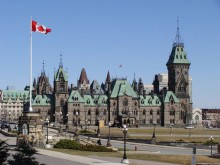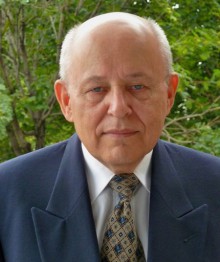Roman Serbyn is a Canadian historian and political scientist of Ukrainian origin; he used to be a professor (retired since 2002) of Russian History and East European History in the University of Quebec, Montreal. Serbyn was born in 1939 in the village of Viktoriv, in the nowadays Halych raion of Ivano-Frankivsk oblast. During the war, he and his family were transferred to Germany, and in 1948 they moved to Canada. Roman Serbyn is an expert on Ukrainian politics, he regularly writes articles and commentaries about Ukrainian history and current political events. Serbyn’s greatest fame comes as a researcher of Holodomor. He considers Fedir Pihido, historian and cultural activist of the Ukrainian Diaspora in Germany, as his ideological precursor; Serbyn even wrote the preface to one of Pihido’s books.
We met in the university town of Montreal McGill University to talk on the phenomenon of the Ukrainian Diaspora in Canada.
So, the first question may seem amateurish, but I still want to hear the answer from you: why does Canada have such a large and influential Diaspora?
“Latin America and the United States accepted Ukrainians even earlier, but only Canada has consistently invited them: the country needed people to develop the land in the west, in the plains, the prairies, which were not too densely populated. There Ukrainians had settled compactly, keeping their customs and the language. The US has tenfold population compared to Canada, and that’s why Ukrainian Diaspora is not that noticeable there. But it’s worth noting that there is a difference between Diaspora, immigrants, and refugees. The first settlers were not refugees, they were economic immigrants. They had entered the Canadian infrastructure; they had become part of Canadian society, at the same time preserving their language and culture as far as they could. They had their schools; they maintained the ties with the Western Ukraine, and the spiritual union with the Soviet Ukraine.”
And how did Canadian society react to the emergence of such a large and close-knit community?
“Whenever there are too many foreign people, too much of another culture, a danger for the country’s unity arises. Thus Canadians had put pressure on Ukrainians in order to assimilate them: for example, young people with unusually-sounding surnames in English were asked to change them.”
Unbelievable.
“It is. But when we arrived, that pressure was a thing in the past. But before that some Ukrainians indeed had to change their names – and some opposed this policy to such an extent, that even some of their rights had been limited.”
You have mentioned the post-war wave. So, generally, what is the difference between the particular generations of Diaspora?
“Immigrants of the early 20th century, even lacking high-profile professional training, had had a sense of belonging to the economic community. The post-World War Two period saw a lot of political exiles immigrating, and they retained patriotic or nationalistic sentiments. In Europe, as we know, for some time there had been camps for refugees or the forcibly deported workers from Ukraine. These camps served as schools of national consciousness – they had functioning education system, civil associations, theaters – a full-fledged Ukrainian life in a ghetto. So, when those people went to Canada, they brought with themselves a high degree of national consciousness. They considered their stay in the West to be temporary; ‘Next year, see each other in Ukraine!’ was their special toast pronounced at holiday celebrations.”
Would it be possible to say that they brought about the organization of the Diaspora’s life?
“No, they only added to that organization. Diaspora had already been congregating around the churches. It is also interesting that after the World War One there were quite influential communist and pro-Soviet Diaspora organizations.”
Sounds like an anomaly.
“It is normal, because the economic situation was difficult; furthermore, after the World War One here Western Ukrainians were kept in special internment camps. After all, Galicia was a part of Austria-Hungary, Canada’s adversary. Additionally, we should consider the influence of the Soviet propaganda, as the true picture of life in Ukraine simply could not reach here. Incidentally, the Left had issued a most interesting newspaper. Of the five Ukrainian publications of the post-World War One period, it was the only one to come out three times a week – more often than others. These people had cherished our culture the same as the others. It was a good thing in itself – it is only bad in the sense that they supported the Soviet system.”
Are there any contradictions between different parts of the Diaspora?
“The new post-war emigration wave failed to find common ground with the old one, and the same problem persists to some extent today. A representative of each new wave considers oneself to be more advanced, and regards the predecessors as those who do not understand or know anything. Over time, this tension had subsided, but we lost people who were appalled by this controversy.
“Diaspora identity raises a sense of duty to the country of origin. But Diaspora wave after the World War Two was too focused on Ukraine and failed to properly integrate into the Canadian life, unlike the previous emigration waves. They were able to organize themselves economically – building stores, credit unions, as well as socially – in churches and youth organizations, such as Ukrainian Youth Association or Plast. They fully provided for their lives – but they had neglected the entry into the Canadian society. So now we have a phenomenon that despite a million Canadians of Ukrainian descent – we even have Ukrainian millionaires – there is a very small representation of Ukrainians in politics or influential positions. And that is a negative thing. It also poses a danger for the newcomers, because, similarly to us in the past, they are unable to find a common ground with the older generation – that is, with us.”
The history repeats itself.
“But it should not be repeated, because we know it – that’s why we can avoid it.”
How would you describe this new, post-Soviet wave you mentioned?
“It is very highly qualified professionally. Almost all of them possess a university degree, but have a low level of national consciousness and weak feelings for Ukraine. This is a repeat of the economic emigration of the early past century – albeit back then, the intellectual level was lower.”
And what is the solution?
“The bridges are being built, but the problem yet persists.”
What the relationship between Ukraine and the Diaspora should be?
“It’s always the same. If a country is enslaved, the duty is to restore it. When it becomes free – the relationship should be kept on the basis of cooperation. There should be a partnership between Ukraine and the Diaspora. Of course, this relationship resembles a bit the one between an elephant and a mouse. But in a fairy tale a mouse was once able to save an elephant, gnawing the ropes when he was tied up. Diaspora was saving its elephant in the Soviet times. Currently, the situation is different. So it is very frustrating for me personally when I see the fundraising effort of the Diaspora, even a small amount – but very often it is older people who give the money they earned by hard work – and then we read how the oligarchs in Ukraine buy themselves a ship for 300 million euros. I do not understand why the president and millionaires in Ukraine could not donate money for the army or the orphans, and why do ordinary people have to sacrifice their children, seeing them reluctant to spare a little wealth? If Poroshenko took 10 percent – or even a smaller fraction – of his net worth and said: ‘I donate the money for this and that,’ and called on everyone to do the same, imagine how he would have lifted his prestige in Ukraine and the world, not to mention the benefits he would have provided for! And it really hurts us when we see a little understanding of such things. Diaspora should be proud of Ukraine. Shouting ‘Glory to Ukraine!’ does little – Ukraine itself should show that it deserves the glory. And this is only a small part of the frustration. Consider the corruption, poverty... When there was the Orange Revolution, Ukrainians manifested themselves, even those who were indifferent before. Why? Because they were proud of their origin. The same goes for the second Maidan. But when we see all the time as the press writes about corruption in Ukraine, and how Ukraine does nothing to deal with it, Ukrainians lose their pride. There is even a term – Ukrainian fatigue; people in the West are already tired of our problems. The same applies to the Diaspora.”
In what way?
“Diaspora are not people who left the country and forgot about it. But they are only useful for Ukraine if they partake in the life of the country in which they reside. Had our organizations in France and Germany been stronger – perhaps the governments of those countries would have implemented a more decisive policy towards Ukraine. On the other hand, I say it again, Ukraine should not think what the Diaspora did for Ukraine, but what Ukraine did for the Diaspora. Germany supports Germans through their Goethe Institute, Italy does the same through the Italian Institute, and even Russia makes its attempts in that regard. And there is Ukraine – how does it want to acquire the commitment not only of the world, but even of its own Diaspora? Over time this issue will become more important. The relevant institutions must be created. The fact is that a developed, rich country, which Ukraine should be, by definition funds such institutions, as any other country does with their diasporas.”
How has the life of the Diaspora changed over the past two years?
“From the latest wave of immigration we have had a lot of Russian-speaking people, and now we see some of them choosing Ukrainian. Their language may not be fluent, but they are calling and offering their help in this or that, apologizing for their poor Ukrainian.”
But how can one keep the balance between multiculturalism and preservation of their identity?
“I often quote Taras Shevchenko: ‘And to your neighbors’ gifts pay heed, yet do not thus neglect your own.’ Yet another quote is: ‘If you would train yourselves alone, you’d have some wisdom of your own.’ These two things are the key both for the Diaspora and Ukraine. Learning from others – but digesting it to make it our own wisdom. In my opinion, the fundamental problem lies in comprehension.”
So how do you see the future of Ukrainian-Canadian community?
“As a historian I’d like to talk about what was before, not about what will happen. If someone says, ‘I am certain,’ it means that he believes, because he has no evidence. I do not see any major threats. Everything will depend on us, on how we organize everything. This atomized society creates a need for one’s own environment, and Diaspora creates such for their children. It is important that we come to a partnership and cooperation with Ukraine, and Ukraine should understand that Diaspora exists, and that it is not some department of a Ministry in Kyiv, it’s a living organism, it’s a part of the Ukrainian people.”









